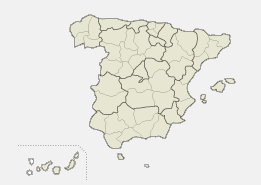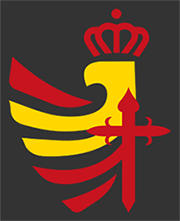- Hastapen
- Texto no traducido
- On the front line
On the front line
viernes 17 de abril de 2020
Zenbakia: 97
The Army’s cooperation in Operation ‘Balmis’ has increased and has been significantly strengthened in a key moment in the fight against the pandemic.

The weight of the Army within Operation ‘Balmis’ - the name given to the military operation which aims to contribute to the resolution of the health emergency caused by the spread of coronavirus Covid-19 - hasn’t stopped growing. After the State of Alarm was declared on the 14th of March, the Ministry of Defence put into place the mechanisms to establish the structure for the organization and coordination of the operation. The involvement of staff and equipment from the Army in different interventions and actions has continued to grow and diversify. In the battle’s key moment, their role became even more significant: amplifying their list of tasks regarding the security of critical infrastructure, controlling people’s movement and health logistics support.
For the soldiers from the Army, the majority of these missions are nothing new, as they are part of their training as combatants and they have been put into practice in many current or recent international operations. This has meant that their effectiveness has been immediate and that coordination and collaboration with the state Law Enforcement, with whom they also share the stage abroad, has been smooth.
On the orders of the Operational Command (Joint Chiefs of Staff), the Land Component Command, “employs the forces and resources of the Army to carry out the planning and implementation of the operations in the national territory, which are necessary to contribute to preserving the safety and well-being of citizens in instances of severe risk, calamity or other public necessities, as well as to help ensure the provision of services, in order to protect people, property and places, all under the provisions of RD 463/2020, from the 14th of March,” explains the Chief of the Land Component Command, Lieutenant General Palacios.
When this edition went to press (31st March), more than 24,000 soldiers from the Army had participated in Operation ‘Balmis’.
HEALTH SUPPORT
Without a doubt, health support is one of the most important elements, bearing in mind the kind of emergency being experienced. Within this category, the provisional hospital for patients with coronavirus which has been erected in the exhibition grounds of IFEMA in Madrid and which is without precedent in Spain, must be mentioned.
The Army helped to establish this compound, which was achieved in record time and is able to house 5,500 beds. Technicians from the 11th Engineer Specialists Regiment supervised the installation with the advice of a specialist in the assembly of health formations from the 1st Health Group. We cannot forget that the Army has staff with experience in this type of tasks in operational zones. On the medical side, there were representatives from the Headquarters of the Health Brigade.
The technical advice has been repeated in other places such as the Valencian Autonomous Community, where they have worked to assemble three health installations in the grounds next to provincial hospitals with the support of the 11th Engineer Specialists Regiment. In other cases, the Army’s collaboration involved the use of their tents for healthcare means. This was the case for the triage station which the 3rd ‘Príncipe’ Infantry Regiment erected using 14 tents in the car parking area of the ‘Central de Asturias’ University Hospital in Oviedo.
Another element of the Army’s support of healthcare is the adaptation of hotel rooms to be used as hospital beds, a task which the 47th ‘Palma’ Infantry Regiment carried out in the Palma Bay hotel in the Mallorcan capital, or the transport of beds from hotels in Alcalá de Henares to the ‘Príncipe de Asturias’ hospital, a task which was carried out by members of the 6th ‘Almogávares’ Paratroopers Brigade.
Furthermore, the Army has staff with healthcare training who are prepared to carry out more specialised tasks, such as those carried out by members of the ‘Gran Capitán’ Third, 1st of the Legion, in the port of Melilla. There, they helped evaluate the health of both foot passengers and people traveling in private vehicles as they disembarked from the ferry.
Of course, we cannot forget the Healthcare Brigade, a unit which was conceived to give logistical healthcare support to units in the operations zone.
Since the State of Alarm began, the Armed Forces have helped to set up 16 field hospitals around all of Spain. With this they are trying to increase the healthcare capabilities and the number of available hospital beds in order to face the pandemic.
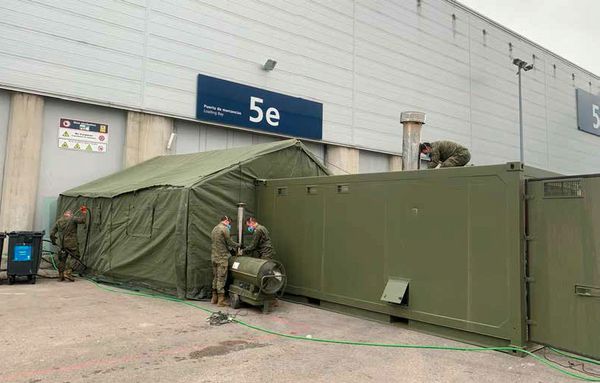
PATROLS
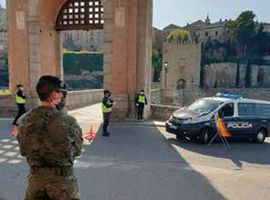
The Army, together with state Law Enforcement, keeps watch to ensure that people respect the restrictions of movement which the Estate of Alarm has put in place, in order to avoid gatherings in public spaces. To achieve this, military patrols walk the streets of hundreds of Spanish towns each day, from provincial capitals to smaller towns. This work also includes the identification of people when necessary. For example, the 16th ‘Canary Islands’ Brigade in Arona (Tenerife) identified two suspicious individuals who turned out to be habitual delinquents from the area and who were handed over to authorities.
Furthermore, they are carrying out border controls in support of the Civil Guard, both on the Portuguese and Moroccan borders.
SUPPORTING THE POPULATION
These days, we can see images of soldiers carrying eldery peoples’ shopping bags back to their homes. This is one of the simplest ways in which the Army is supporting the civilian population in this emergency, but it is not the only way.
Another prominent means of supporting the population is protecting vulnerable people. For example, the 41st Logistical Support Group from Zaragoza carried 225 bunks to equip the temporary accommodation centre which the Barcelona City Council has established in the trade show centre in the Catalan capital. This unit has also distributed food from food banks in Zaragoza to eldery care homes throughout the province. In La Coruña, the Headquarters of the Logistical Operations Force carried bunks and blankets to the Riazor Sports Centre, where there is a centre for homeless people. For its part, the 11th Logistical Support Group provided 150 canvas dividers for the temporary shelter for homeless people which the Community of Madrid has erected in the exhibition grounds of the IFEMA centre in Madrid.
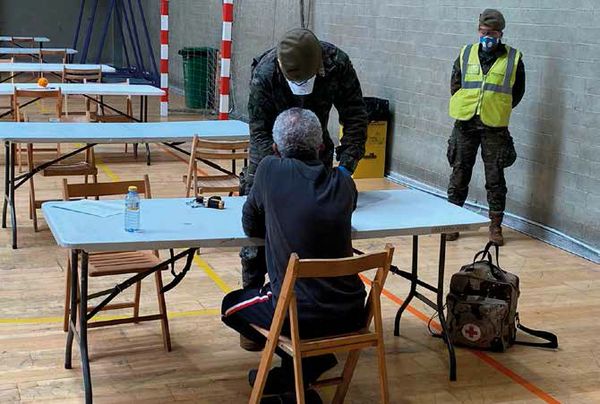
DISINFECTION
Thanks to the capacities which the Army has, and the training of its staff, soldiers are also disinfecting facilities and public spaces.
As their unit is specialised in the defence against nuclear, biological and chemical agents, the 1st ‘Valencia’ NBCR regiment has been one of the most active. Its staff continue to clean official headquarters and places like Bilbao Airport, where they arrived on board two NH-90 helicopters from the 3rd Helicopter Battalion. To do their job they have the support of members of the 45th ‘Garellano’ Infantry Regiment.
Furthermore, the NBCR teams and companies from the Brigades or the Veterinary Services from the bases, barracks and establishments have taken part in this work in places like:
- The Fire Station in Palma de Mallorca, where the General Command of the Balearic Islands took part
- The Galician Health Service’s continuous attention point in Villagarcía de Arosa (where staff from the Headquarters Battalion of the 7th ‘Galicia’ Brigade took part)
- In elderly care homes such as the Álora care home in Malaga (where staff from the NBCR company of the 2nd ‘Rey Alfonso XIII’ Brigade took part)
- In medical centres such as the one in Valdemoro, Madrid (where staff from the 6th ‘Almogávares’ Brigade took part)
- In the Police Headquarters in Badajoz (where staff from the 11th ‘Extremadura’ Brigade took part)
- In various places in Aragon, Navarre and Catalonia (where the 1st ‘Aragon’ Brigade took part)
- In train stations such as Chamartín station (where the 12th ‘Guadarrama’ Brigade took part)
- In elderly care homes in Valladolid, Segovia and Avila (where the Services Unit from the ‘El Empecinado’ Base took part)
- Or in a residence in Ubrique, Cadiz (where the 2nd Centre for Troop Training and the 4th Coastal Artillery Regiment took part).
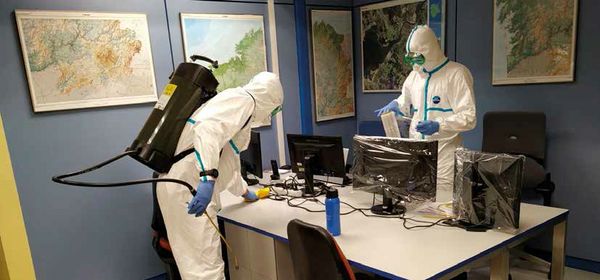
SECURITY
Another mission for which members of the Army are well prepared is reconnaissance and presence in sensitive places, which these days they are carrying out in key infrastructural locations such as ports, airports, train and bus stations, energy plants or fuel supply points, in order to help Law Enforcement on matters of security. These include the presence every morning of members of the 12th "Guadarrama" Brigade at Madrid's busiest train stations in the early hours of the morning, personnel from the General Command of Melilla inspecting the Endesa plant, the desalination plant or the fuel storage facilities in the port of the autonomous city, or the reinforcement of security provided by members of various units at the nuclear power plants in Cofrentes (Valencia) and Almaraz (Cáceres), among many other tasks.
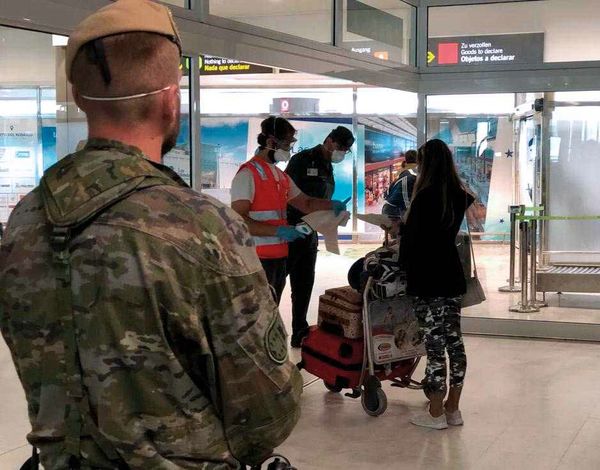
CHRONOLOGY
11th March
The World Health Organization elevates the public health emergency caused by Covid-19 to an international pandemic.
13th March
The Armed Forces suspend all exercises and manoeuvres and present the government with a list of their capacities to deal with coronavirus.
14th March
A State of Alarm is declared by Royal Decree 463/2020 on the 14th of March, to manage the health crisis situation caused by Covid-19. The Armed Forces are made available to the government for whatever is required of them.
15th March
Emergency meeting in the Ministry of Defence and Operation ‘Balmis’ is put into action to fight coronavirus.
16th March
The Ground Component Command is activated and the Army units’ missions to support civilian authorities and state Law Enforcement begin.
19th March
Soldiers from the Army are taking part in an increasing number of different missions.
25th March
The extension of the State of Alarm until the 11th of April is approved in Congress. With this, the Armed Forces’ missions regarding the transport of ill people, protecting infrastructure and logistical health support are also extended.
The withdrawal of 150 Spanish soldiers from Iraq due to the stoppage of training activities in the country is also announced.

EJERTZITOAREN UNITATEAK
- Araba Álava |
- Albacete |
- Alicante |
- Almería |
- Asturias |
- Ávila |
- Badajoz |
- Barcelona |
- Burgos |
- Cáceres |
- Cádiz |
- Cantabria |
- Castellón |
- Ceuta |
- Ciudad Real |
- Córdoba |
- A Coruña |
- Cuenca |
- Girona |
- Granada |
- Guadalajara |
- Gipuzkoa |
- Huelva |
- Huesca |
- Islas Baleares |
- Jaén |
- León |
- Lleida |
- Lugo |
- Madrid |
- Málaga |
- Melilla |
- Murcia |
- Navarra |
- Ourense |
- Palencia |
- Las Palmas |
- Pontevedra |
- La Rioja |
- Salamanca |
- Segovia |
- Sevilla |
- Soria |
- Tarragona |
- Santa Cruz de Tenerife |
- Teruel |
- Toledo |
- Valencia |
- Valladolid |
- Bizkaia |
- Zamora |
- Zaragoza
